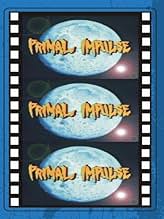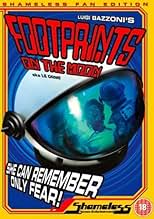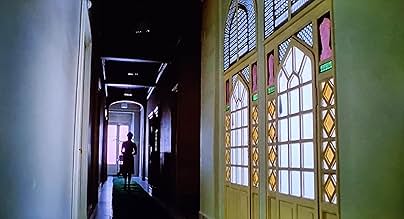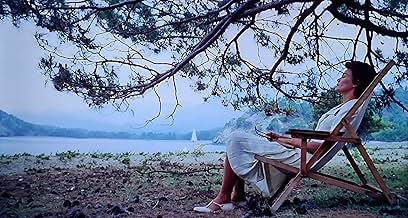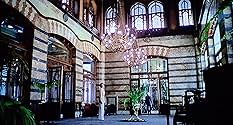IMDb-BEWERTUNG
6,6/10
2753
IHRE BEWERTUNG
Füge eine Handlung in deiner Sprache hinzuAfter being tormented by dreams about astronauts on the moon, a translator visits a deserted seaside town whose inhabitants know her, although she does not know them.After being tormented by dreams about astronauts on the moon, a translator visits a deserted seaside town whose inhabitants know her, although she does not know them.After being tormented by dreams about astronauts on the moon, a translator visits a deserted seaside town whose inhabitants know her, although she does not know them.
John Karlsen
- Alfredo Laurenti
- (as John Carlsen)
- …
Miriam Acevedo
- Alice's Supervisor
- (as Myriam Acevedo)
Rosita Torosh
- Marie Leblanche
- (as Rosita Toros)
Bruno Degni
- Member of the International Congress
- (Nicht genannt)
Franco Magno
- Member of the International Congress
- (Nicht genannt)
Lidia Zanussi
- Member of the International Congress
- (Nicht genannt)
Luciano Zanussi
- Member of the International Congress
- (Nicht genannt)
Feridun Çölgeçen
- Hotel Concierge
- (Nicht genannt)
Empfohlene Bewertungen
Footprints on the Moon is an example of what could be described as a bloodless giallo. These were entries from the Italian sub-genre that were more directly psychological in approach. After the success of Dario Argento's The Bird with the Crystal Plumage in 1970, these more subtle gialli became scarcer on the ground and a host of serial killer flicks were the norm. Footprints harks back to the older style but adds a dash of 70's paranoid thriller into the mix. The result is a somewhat surreal film which has a decidedly enigmatic tone and effect. It was directed by Luigi Bazzoni and shot by Vittorio Storaro, who also was cinematographer on Crystal Plumage as well as the later Hollywood film Apocalypse Now (1979). This duo also worked together on the earlier classic style giallo The Fifth Cord (1971). Both their movies display restraint in terms of salacious material, while both look beautiful due to Storaro's consummate skill. The lunar material looks wonderfully off-kilter, the widescreen compositions are consistently great and the use of black and white to recall strange memories and dreams works extremely well.
It starts fantastically well with a startling opening segment set on the moon, where we see astronauts drag an unconscious compatriot and then abandon him. It turns out a female translator is dreaming about this, when she wakes she discovers she has no memory of the last three days. She recalls a film she saw many years earlier called 'Footprints on the Moon', a film that recalls her dream, where a scientific experiment is carried out where astronauts are left stranded on the moon to test them. She discovers a torn postcard addressed to her of a place she is sure she knows but does not know why, she travels to this off-season tourist area and meets several people who know her but whom she does not know herself.
This one is typified by a sustained atmosphere of dread and it really delves into the fragile psychology of the protagonist, who is very well played by Florinda Bolkan, who was one of the most talented of the performers to regularly appear in gialli. This role is a fairly complex one and benefits a lot from Bolkan's subtle skills. There is also an appearance from another giallo regular, Nicoletta Elmi, the little red headed girl who played oddball children in several films from the time. In this film, she is given a bit more to do and is a little more integral to the plot. Evelyn Stewart and Klaus Kinski appear briefly, the former as Bolkan's friend in Italy and the latter as the mad scientist Blackmann from the film-within-a-film. The location where most of the action occurs is the resort of Garma which is an otherworldly dream-like place, with a vaguely Arabic feel and ruins; it feels like a dying place. The film feels like a combination of dreams, reality and movies. The science fiction film-within-a-film is a strong idea and the image of the abandoned astronaut is a peculiar and compelling one. This sci-fi thread blends into the fabric of the main story and that by the unforgettable final moments it has encroached entirely into Bolkan's reality. It's a memorably surreal way to end one of the most distinctive films in the giallo sub-genre.
It starts fantastically well with a startling opening segment set on the moon, where we see astronauts drag an unconscious compatriot and then abandon him. It turns out a female translator is dreaming about this, when she wakes she discovers she has no memory of the last three days. She recalls a film she saw many years earlier called 'Footprints on the Moon', a film that recalls her dream, where a scientific experiment is carried out where astronauts are left stranded on the moon to test them. She discovers a torn postcard addressed to her of a place she is sure she knows but does not know why, she travels to this off-season tourist area and meets several people who know her but whom she does not know herself.
This one is typified by a sustained atmosphere of dread and it really delves into the fragile psychology of the protagonist, who is very well played by Florinda Bolkan, who was one of the most talented of the performers to regularly appear in gialli. This role is a fairly complex one and benefits a lot from Bolkan's subtle skills. There is also an appearance from another giallo regular, Nicoletta Elmi, the little red headed girl who played oddball children in several films from the time. In this film, she is given a bit more to do and is a little more integral to the plot. Evelyn Stewart and Klaus Kinski appear briefly, the former as Bolkan's friend in Italy and the latter as the mad scientist Blackmann from the film-within-a-film. The location where most of the action occurs is the resort of Garma which is an otherworldly dream-like place, with a vaguely Arabic feel and ruins; it feels like a dying place. The film feels like a combination of dreams, reality and movies. The science fiction film-within-a-film is a strong idea and the image of the abandoned astronaut is a peculiar and compelling one. This sci-fi thread blends into the fabric of the main story and that by the unforgettable final moments it has encroached entirely into Bolkan's reality. It's a memorably surreal way to end one of the most distinctive films in the giallo sub-genre.
I consider this a missed opportunity. I have very fond memories of the filmmaker's debut, an interesting psychosexual oddity called La Donna Del Lago, and watching this I'm inclined to think that earlier film worked so well because the giallo had not been mapped down yet; so he was free to travel where it was novel at the time. Polanski got there that same year, but he was already a name and had Deneuve with him and so made the bigger splash. Film history has noted Repulsion.
This could have been even better. He has brought ambitious imagination with him, a visual palette of bright golden hues and relaxing blues, a sense of place and folded mysterious time with memory from Marienbad. He has Vittorio Storaro's eye behind the lens.
The opening is more than promising. A woman wakes up with no memory of three days past. She has just seen a dream, a feverish vision of astronauts staggering on blasted moonscapes, which she remembers is from a movie called the same as the one we're watching; but a movie she left without watching the ending. She goes to Italy to investigate, in an effort to bring these images into focus.
There it falls apart, in Italy incidentally. In the ten years since that first film that was in some ways a giallo ancestor the genre had come and was already on its way out. Between these two films Bazzoni had worked where it was the trend in the Italian industry, making a western and another giallo called The Fifth Chord. So when the more ambitious material for this came together, there were already footsteps he was expected to walk and had been trained to. The circumstances of a commercial movie industry were just so.
So for the middle part of the film we get a giallo worked from convention. The convoluted plot where each character withholds crucial information until the time is right, and the protagonist has to cobble together a puzzle from clues and red herrings. Much ado.
It comes full circle in the finale; the agents which she has imagined to be controlling her illusion return to pull her back into the fiction of the dream. It happens with extraordinary images of a stretch of empty cosmic beachside.
Bazzoni never made another film after this. In the meantime, Polanski had rocketed into Hollywood orbit and was already on his way out. I reckon that Bazzoni was one of our sad losses, but alas he never made it to France where money didn't always expect to fill a double-bill.
This could have been even better. He has brought ambitious imagination with him, a visual palette of bright golden hues and relaxing blues, a sense of place and folded mysterious time with memory from Marienbad. He has Vittorio Storaro's eye behind the lens.
The opening is more than promising. A woman wakes up with no memory of three days past. She has just seen a dream, a feverish vision of astronauts staggering on blasted moonscapes, which she remembers is from a movie called the same as the one we're watching; but a movie she left without watching the ending. She goes to Italy to investigate, in an effort to bring these images into focus.
There it falls apart, in Italy incidentally. In the ten years since that first film that was in some ways a giallo ancestor the genre had come and was already on its way out. Between these two films Bazzoni had worked where it was the trend in the Italian industry, making a western and another giallo called The Fifth Chord. So when the more ambitious material for this came together, there were already footsteps he was expected to walk and had been trained to. The circumstances of a commercial movie industry were just so.
So for the middle part of the film we get a giallo worked from convention. The convoluted plot where each character withholds crucial information until the time is right, and the protagonist has to cobble together a puzzle from clues and red herrings. Much ado.
It comes full circle in the finale; the agents which she has imagined to be controlling her illusion return to pull her back into the fiction of the dream. It happens with extraordinary images of a stretch of empty cosmic beachside.
Bazzoni never made another film after this. In the meantime, Polanski had rocketed into Hollywood orbit and was already on his way out. I reckon that Bazzoni was one of our sad losses, but alas he never made it to France where money didn't always expect to fill a double-bill.
Interesting and entertaining 'mind game', dream-like, moody mystery, as a woman can't account for several lost days of her life, or why so many people at a resort she's never visited seem to know her.
She's also haunted by very odd black and white dreams where an astronaut is betrayed and left to die alone on the moon.
The film is slow in parts, and some of the big twists are easy to see coming, but it is beautifully photographed by Vittorio Storraro, and eschews the gratuitous violence and awkward sex of most of the Italian thrillers of the era.
This doesn't feel like its trapped by any formula or rules. And the acting is pretty good for a dubbed film.
Not in the class of films like 'Don't Look Now" or "Vertigo", but gets points for trying to be and doing so in a classy way. I'll be interested to see this again.
She's also haunted by very odd black and white dreams where an astronaut is betrayed and left to die alone on the moon.
The film is slow in parts, and some of the big twists are easy to see coming, but it is beautifully photographed by Vittorio Storraro, and eschews the gratuitous violence and awkward sex of most of the Italian thrillers of the era.
This doesn't feel like its trapped by any formula or rules. And the acting is pretty good for a dubbed film.
Not in the class of films like 'Don't Look Now" or "Vertigo", but gets points for trying to be and doing so in a classy way. I'll be interested to see this again.
Alice (Florinda Bolkan), a translator living in Italy, discovers that she has a memory loss and can't recall the last couple of days. She starts to follow a trace of memory fragments, which leads her to the small town of Garma. People in the town seem to recognize her and she's beginning to suspect that the re-occurring nightmares of astronauts conducting horrible experiments has something to do with her own amnesia.
The movie is interesting and the plot is good, but it's a bit to slow moving and arty for my taste. The plot takes some nice twists and it's really hard to figure out where it's heading. Florinda Bolkan is good in her role (but even better in "Flavia the Heretic") and it's always nice to see "star" child actor Nocoletta Elmi. Klaus Kinski's role is too small though. This is not a movie for the die-hard gore hound or exploitation addict, but still a very nice hour-and-a-half mystery.
The movie is interesting and the plot is good, but it's a bit to slow moving and arty for my taste. The plot takes some nice twists and it's really hard to figure out where it's heading. Florinda Bolkan is good in her role (but even better in "Flavia the Heretic") and it's always nice to see "star" child actor Nocoletta Elmi. Klaus Kinski's role is too small though. This is not a movie for the die-hard gore hound or exploitation addict, but still a very nice hour-and-a-half mystery.
A slow-moving film which retains a certain cult ; it seems it's all in a dream ,or a nightmare more like ; few special effects,no gore, but a great sense of mystery,with an open ending which will make all viewers interpreting the meaning of this bewildering story according to their own sensitivity .
With its deja vu feeling, its bizarre characters (Lila Kedrova) , its strange experiments on the moon , one can wonder whether the heroine is losing her mind, or is it a recurrent nightmare ? Its atmosphere sometimes recall "carnival of souls" ,probably the first important indie in the history of cinema .The beauty of Florinda Bolkan and the threatening face of Klaus Kinski add to the fascinating and deadly charm of this offbeat work.
With its deja vu feeling, its bizarre characters (Lila Kedrova) , its strange experiments on the moon , one can wonder whether the heroine is losing her mind, or is it a recurrent nightmare ? Its atmosphere sometimes recall "carnival of souls" ,probably the first important indie in the history of cinema .The beauty of Florinda Bolkan and the threatening face of Klaus Kinski add to the fascinating and deadly charm of this offbeat work.
Wusstest du schon
- WissenswertesOn Mill Creek's 50 movies set "Sci-Fi Invasion", the movie is available under its alternate title "Primal Impulse".
- PatzerCrew member visible reflected in mirror when Alice wakes up in the Peacock Room.
- Zitate
Alice Campos: I'm not crazy!
Top-Auswahl
Melde dich zum Bewerten an und greife auf die Watchlist für personalisierte Empfehlungen zu.
- How long is Footprints on the Moon?Powered by Alexa
Details
- Laufzeit
- 1 Std. 36 Min.(96 min)
- Sound-Mix
- Seitenverhältnis
- 1.85 : 1
Zu dieser Seite beitragen
Bearbeitung vorschlagen oder fehlenden Inhalt hinzufügen


